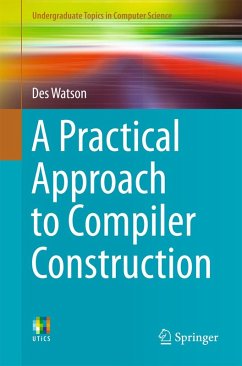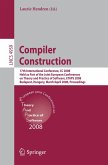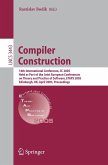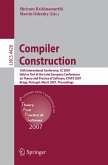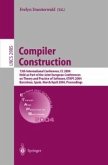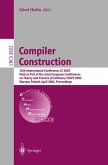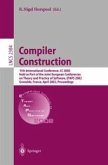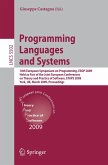This book provides a practically-oriented introduction to high-level programming language implementation. It demystifies what goes on within a compiler and stimulates the reader's interest in compiler design, an essential subject of computer science. Programming language analysis and translation techniques are used in many software application areas.
A Practical Approach to Compiler Construction covers the fundamental principles of the subject in an accessible way. It presents the necessary background theory and shows how how it can be applied to implement complete compilers. A step-by-step approach, based on a standard compiler structure is adopted, presenting up-to-date techniques and examples. Strategies and designs are described in detail to guide the reader in implementing a translator for a programming language.
A simple high-level language, loosely based on C, is used to illustrate aspects of the compilation process. Code examples in C are included, together with discussion and illustration of how this code can be extended to cover the compilation of more complex languages. Examples are also given of the use of the flex and bison compiler construction tools. Lexical and syntax analysis is covered in detail together with a comprehensive coverage of semantic analysis, intermediate representations, optimisation and code generation. Introductory material on parallelisation is also included.
Designed for personal study as well as for use in introductory undergraduate and postgraduate courses in compiler design, the author assumes that readers have a reasonable competence in programming in any high-level language.
A Practical Approach to Compiler Construction covers the fundamental principles of the subject in an accessible way. It presents the necessary background theory and shows how how it can be applied to implement complete compilers. A step-by-step approach, based on a standard compiler structure is adopted, presenting up-to-date techniques and examples. Strategies and designs are described in detail to guide the reader in implementing a translator for a programming language.
A simple high-level language, loosely based on C, is used to illustrate aspects of the compilation process. Code examples in C are included, together with discussion and illustration of how this code can be extended to cover the compilation of more complex languages. Examples are also given of the use of the flex and bison compiler construction tools. Lexical and syntax analysis is covered in detail together with a comprehensive coverage of semantic analysis, intermediate representations, optimisation and code generation. Introductory material on parallelisation is also included.
Designed for personal study as well as for use in introductory undergraduate and postgraduate courses in compiler design, the author assumes that readers have a reasonable competence in programming in any high-level language.
Dieser Download kann aus rechtlichen Gründen nur mit Rechnungsadresse in A, B, BG, CY, CZ, D, DK, EW, E, FIN, F, GR, HR, H, IRL, I, LT, L, LR, M, NL, PL, P, R, S, SLO, SK ausgeliefert werden.
"I found this book easy to read, with relevant examples and a good set of references. For me, its most interesting feature is the strategy used to support a particular audience: people who need to process text but will not write production compilers. The material itself has been standard for 30 years." (Computing Reviews, August, 2017)
"The book is an excellent resource for anyone who is looking for an introduction to the basic structure and concepts of a compiler. Better-suited works are available for an in-depth analysis." (Jonas Devlieghere, Computing Reviews , February, 16, 2018)
"The book is an excellent resource for anyone who is looking for an introduction to the basic structure and concepts of a compiler. Better-suited works are available for an in-depth analysis." (Jonas Devlieghere, Computing Reviews , February, 16, 2018)

